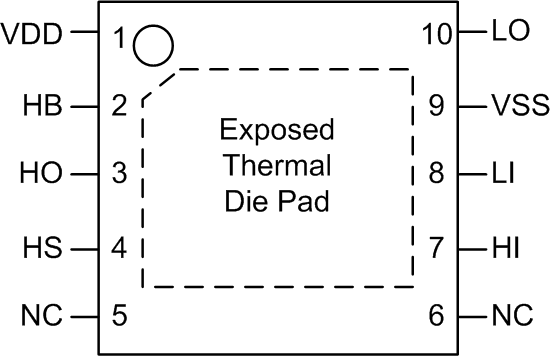SLUSC72B May 2015 – March 2016 UCC27201A-Q1
PRODUCTION DATA.
- 1 Features
- 2 Applications
- 3 Description
- 4 Revision History
- 5 Pin Configuration and Functions
- 6 Specifications
- 7 Detailed Description
- 8 Application and Implementation
- 9 Power Supply Recommendations
- 10Layout
- 11Device and Documentation Support
- 12Mechanical, Packaging, and Orderable Information
Package Options
Mechanical Data (Package|Pins)
Thermal pad, mechanical data (Package|Pins)
- DDA|8
Orderable Information
5 Pin Configuration and Functions
DDA Power Pad
8-Pin SOIC-8
(Top View)

Pin VSS and the exposed thermal die pad are internally connected.
Pin Functions
| PIN | I/O(2) | DESCRIPTION | ||
|---|---|---|---|---|
| NAME | DDA | DMK | ||
| HB | 2 | 2 | P | High-side bootstrap supply. The bootstrap diode is on-chip but the external bootstrap capacitor is required. Connect positive side of the bootstrap capacitor to this pin. Typical range of HB bypass capacitor is 0.022 μF to 0.1 μF, the value is dependant on the gate charge of the high-side MOSFET however. |
| HI | 5 | 7 | I | High-side input. |
| HO | 3 | 3 | O | High-side output. Connect to the gate of the high-side power MOSFET. |
| HS | 4 | 4 | P | High-side source connection. Connect to source of high-side power MOSFET. Connect negative side of bootstrap capacitor to this pin. |
| LI | 6 | 8 | I | Low-side input. |
| LO | 8 | 10 | O | Low-side output. Connect to the gate of the low-side power MOSFET. |
| N/C | – | 5/6 | - | No connection. Pins labeled N/C have no connection. |
| PowerPAD™ | Pad(1) | Pad(1) | G | Connect to a large thermal mass trace or GND plane to dramatically improve thermal performance. |
| VDD | 1 | 1 | P | Positive supply to the lower gate driver. De-couple this pin to VSS (GND). Typical decoupling capacitor range is 0.22 μF to 1.0 μF. |
| VSS | 7 | 9 | G | Negative supply terminal for the device which is generally grounded. |
(1) Pin VSS and the exposed thermal die pad are internally connected on the DDA and DMK packages. Electrically referenced to VSS (GND).
(2) P = Power, G = Ground, I = Input, O = Output, I/O = Input/Output
